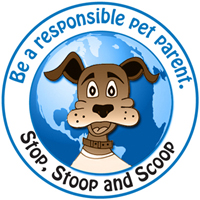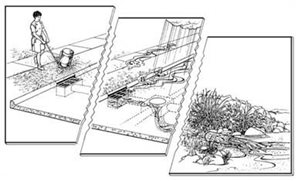Stormwater Management
The Solution to Stormwater Pollution
As stormwater flows over driveways, lawns, and sidewalks, it picks up debris, chemicals, dirt, and other pollutants. Stormwater can flow into a storm sewer system or directly to a lake, stream, river, wetland, or coastal water. Anything that enters a storm sewer system is discharged untreated into the waterbodies we use for swimming, fishing, and providing drinking water. Polluted runoff is the nation’s greatest threat to clean water. By practicing healthy household habits, homeowners can keep common pollutants like pesticides, pet waste, grass clippings, and automotive fluids off the ground and out of stormwater. Adopt these healthy household habits and help protect lakes, streams, rivers, wetlands, and coastal waters. Remember to share the habits with your neighbors!
Important information for pool owners: That clean, sparkling, chlorinated water in your pool is toxic to wildlife and fish when discharged into a storm drain or directly into a waterway. Click here to access information from the EPA on safe ways to discharge chlorinated water.
For more information, visit:
Businesses also need to be aware that things they do or products they use in their daily operations can enter the stormwater system and effect our water sources. Runoff from construction sites, spills at fueling areas, and chemicals used to keep outdoor areas clean can be picked up by rainwater and whisked into the storm sewer system. Visit the U.S. Environmental Protection Agency NPDES web page to learn what stormwater practices are required by law and what businesses can do help keep pollutants out of the stormwater system.
Vehicle wastes are among the many common stormwater pollutants that can degrade water quality. Stormwater runoff from vehicle maintenance and repair wastes has been found to contain high concentrations of metals, organics, oil, and grease. When these wastes wash into our waters they can kill aquatic organisms. Metals such as chromium, cadmium, lead, and zinc have the potential to contaminate drinking water supplies as well as bioaccumulate in aquatic life. Organics such as engine degreasers, cleaners, and other solvents can also degrade water quality.
Examples of Stormwater Pollution
Stormwater Pollutants include sediment, sand, cigarettes, litter, cooking oil and grease, paint, automobile fluids, yard wastes, pet waste, pesticides, and fertilizers.
You Can Help Keep Our Local Waterways Clean
Dumping oil, chemicals, treated pool water, sediment, and other pollutants into creeks, streams, and storm sewers is not only harmful to the environment, it's illegal. If you see questionable storm sewer dumping, observe sediment runoff or notice an illicit discharge coming from a storm sewer outfall, use the chart below to promptly notify the proper agency.
| Violation |
Who to Contact |
| Sediment runoff or erosion from a construction site: |
Middletown Township Department of Building & Zoning
215-750-3800, ext. 1115
Bucks County Conservation District
215-345-7577 |
| Sediment runoff or erosion from a construction site: |
Middletown Township Department of Building & Zoning
215-750-3800, ext. 1115
Bucks County Conservation District
215-345-7577 |
| Observing a pollution event or pollutants in a waterway: |
Pennsylvania Dept. of Environmental Protection
484-250-5900 or 1-800-541-2050 |
| Broken water mains or leaking sanitary sewer lines: |
Lower Bucks County Joint Municipal Authority
Water: 215-547-9581; Sewer: 215-946-9731
Bucks County Water and Sewer Authority
215-343-2538 or 1-800-222-2068 |
| Spills: |
Pennsylvania Dept. of Environmental Protection
484-250-5900 or 1-800-541-2050 |
| Illegal dumping activity into waterways: |
Middletown Township Department of Building & Zoning
215-750-3800, ext. 1115
Pennsylvania Dept. of Environmental Protection
484-250-5900 or 1-800-541-2050 |
| Unusual flow or odors from outfall pipes during dry weather (72 hours after a rain storm): |
Middletown Township Department of Building & Zoning
215-750-3800, ext. 1115 |
Stormwater Management Informative Brochures and Documents to Download
Additional information specific to the construction industry can be found at the Construction Industry Compliance Assistance Site. Information specific to the automotive recycling industry can be found at Environmental Compliance for Automotive Recyclers.
Pet Waste and Water Quality

Did you know the deposit Fido made on the lawn this morning is a growing threat to our environment? Did you also know that studies have found that 40 percent of pet owners do not pick up after their pets?
The average dog produces a half a pound of waste per day. In 2009, 39,650 dogs were licensed by their owners in Bucks County. That amounts to almost 20,000 pounds of dog waste dumped on the ground, here where we live, every day. If 40% of the pet owners in Bucks County don't pick up after their four-footed friends, the amount of dog waste left behind on the ground to decompose or be carried away by stormwater runoff to our creeks and waterways adds up to a whopping 1,500 tons a year!
When pet waste reaches our waterways, the untreated bacteria, nutrients, and parasites contaminate the water and pose health risks to humans and other animals. Don't let your dog be a canine sewage pipe. Flush your dog's waste down the toilet, toss it in the trash or better yet, get a doggy composter.
Click here to read information posted on the EPA's blog "Greening the Apple" about the importance of cleaning up after your pet. The blog points out how pet waste can wind up in the Hudson River. In our area, it's the Delaware River which can be affected by dog waste and other pollutants. The Delaware River is the source of most of our drinking water here in Midddletown, so reducing pollutants, pet waste and other contaminates that can reach the river truly matters!
Be a responsible pet parent; always remember to Stop, Stoop and Scoop. Your pet(s) and the environment will thank you!
Fertilize Your Lawn, Not Your Driveway!

The main objective in applying fertilizer should be to add necessary nutrients in the required amounts and at the proper time to achieve good quality turf. Fertilizer that is accidentally broadcast onto impervious surfaces such as streets, sidewalks, and driveways and not swept up will be washed into our streams and creeks when it rains. Nutrients and pesticides in the fertilizer can harm fish and animals in our waterways. Drop spreaders provide a more precise application than rotary spreaders that disperse particles in a wide pattern. Always sweep or blow stray fertilizer back onto the lawn or bag it to use another day. Always follow the instructions on how much fertilizer to apply. Applying more than the recommended amount is not only harmful to your lawn and the environment, it is also an unnecessary expense.
Click here to read BMP's on Landscaping and Lawn Care
Remember: Only rain down the drain!